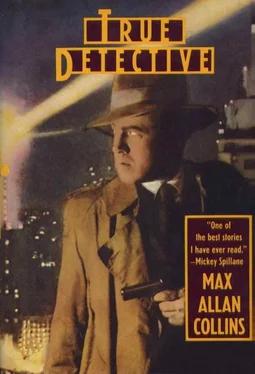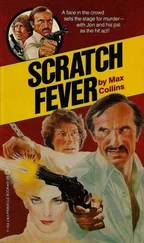Tonight, though, I’d sat in the audience at Hollywood, and Mary Ann had impressed me. It was odd to sit in a theater and — where stage or screen should be — see a big glassed-in sound stage, inside of which were padded walls like an asylum, where not inmates but actors with scripts were caged, standing before mikes, sound effects man at his table with his blank gun and frame door to slam and quarter-flight of steps to climb in the background. Above the forty-foot glass enclosure were two smaller glass-enclosed rooms for the sound engineers; the control rooms were dimly lit, but lights on their console panels winked at the crowd. An impressive theater, unlike anything I’d ever seen before.
But it was Mary Ann that impressed me most.
Even with the glass curtain separating her from the audience, they loved her. And she loved them back. The awkwardness of standing reading a script did not keep her from making eye contact with them, from playing out to the hilt her role of damsel-in-distress in the ludicrous private eye melodrama she was cast in tonight. She had dressed simply, in a milk-chocolate linen dress, with tiny pearl buttons down the front, some puff in the shoulders, the skirt clinging, then flaring a bit at the knees, and of course a matching beret; somehow it made her look innocent and worldly at the same time. When the show signed off the air, and the actors-under-glass took their bows, it was Mary Ann, not guest star Adolphe Menjou, who got the big hand.
“You were terrific,” I said.
She grinned, crinkling her chin. “You never said that about my acting before.”
“I never saw you wrap an audience around your pinkie before. Say, what kept you?”
She’d been nearly half an hour after the performance before meeting up with me outside.
“You won’t believe this,” she said, “but a scout for Monogram was in the audience.”
“Somebody connected with the movies they’re making here, you mean?”
“Yes, but he works for Monogram in Hollywood. Real Hollywood.”
I wasn’t sure there was any such thing, but I said, “And you’ve been offered a part?”
She was beaming. “Yes! Isn’t it exciting? In August, if I can get a week off from ‘Just Plain Bill.’ They can write me out; give me the flu or send me on a trip or something. Isn’t that just splendid?”
I was happy for her; I didn’t mention that in the weeks previous she had dismissed Monogram as “poverty row,” and had pooh-poohed the making of two-reelers here at the fair as a “small-time publicity scheme, catering to these hick crowds.” But I also knew she’d filed her name with the Monogram people’s casting office, as had most of the actors in Chicago.
We were walking past the Enchanted Island, and its giant boy on his Radio Flyer wagon. It was a little windy tonight; almost chilly, for summer, but pleasant enough.
“Mr. Sullivan — he’s the director I’ll be working with — says it will be a sort of paid screen test. If Mr. Ostrow in Hollywood likes my work in the two-reeler, I could be flown out to Hollywood and put under contract!”
“It sounds like money in the bank to me,” I said, meaning it. She’d been good tonight; she’d connected with that audience like Barney’s left and Canzoneri’s chin.
“Nathan,” she said quietly, as we moved among the crowd, wandering past the circular court of the Electrical Building, where a fountain fanned water and light in a silver arc before the pastel orange-and-blue building. “You’ll come out there with me, if they send for me — won’t you?”
“Sure,” I said.
“Do you mean it?”
“Sure. I can pack my business in a suitcase in a minute flat. California’s perfect for my kind of work.”
“You’re not just saying this?”
I stopped her; put my hands on her arms. I looked into the Claudette Colbert eyes and said, “I’d follow you anywhere. To hell, or Hollywood. Got that?”
She smiled and hugged me; some people going by smiled at us.
“Then take me to the fair,” she said impishly.
“Where the hell do you think you are?”
“There’s some things we haven’t done.”
“Like what?”
“The Streets of Paris. I want to see Sally Rand take off her clothes.”
“Sally Rand doesn’t take off her clothes; she already has her clothes off when she comes out. The trick is to catch a look at her when she’s waving these damn ostrich plumes around.”
“You speak as if from experience.”
“This is what the boys tell me. I wouldn’t know, myself. Why would I want to go see a gorgeous blonde parade around in her skin? For that matter, why would you?”
“Just checking out the competition. They say you haven’t seen the fair if you haven’t seen Sally Rand.”
Actually, I did know why she wanted to check Sally Rand out. It’d been in the papers, just recently: several of the Hollywood studios were after the sensation of the fair to sign with ’em. So Sally Rand was competition.
But I had been hoping to go right home, either to my place or hers, and I told her so. What I didn’t tell her was why.
Yesterday somebody had tried to kill me; I was convinced of that. I didn’t know whether or not Dipper Cooney had been silenced on purpose, or had just happened to be there when an attempt on me was made. But my instinct was that I had been the prime target last night. And the only thing I’d been up to lately, outside of working at the fair, was snooping around looking for Mary Ann’s brother.
I couldn’t tell her about last night. I couldn’t tell anybody, not Eliot, maybe not even Barney. That dark residential side street had been deserted enough for me to risk leaving poor Cooney dead, there on the sidewalk, and I’d walked quickly back the number of blocks to my car in the stadium parking lot and went home, to my Murphy bed. Because me being involved with another shooting right now — what with the hostile cops and yellow journalists that would attract — was something I could do without.
Apparently nobody had seen what happened: there’d been no screams, no shouts, when Cooney took those silenced slugs — no lights going on suddenly in windows. Just me tumbling into the bushes, and when the car had gone by and showed no sign of returning, and it seemed safe to come out, I took my powder, and unless somebody had recognized one of us when I’d gone pushing through the crowd after Cooney, I didn’t see how I could be pulled in on this.
And today had borne this out. I’d had a call from one of the boys from the pickpocket detail, telling me Cooney had been killed, wondering if that news was worth the fin I’d been offering ’round; and I’d said no, Cooney wasn’t worth squat to me dead, but if my pal came around to Barney’s sometime, I’d buy him a beer for his trouble. And we’d left it at that.
Also, Cooney had got a small mention on the inside pages of the afternoon papers: a longtime pickpocket with a record had been gunned down, and police figured it was a mob-related slaying, but had no leads. It would be added to the list of hundreds of gangland slayings in Chicago these last ten or fifteen years; if a gangland slaying had ever been solved in Chicago, I hadn’t heard about it. Except for Jake Lingle’s, of course.
But what did Cooney’s death mean? I was afraid I knew. I was afraid that Mary Ann’s brother, with his connections to Ted Newberry via the Tri-Cities liquor ring, had got in hot water with the Nitti crowd, and now that my snooping was leading me to Nitti’s doorstep, the bullets were starting to fly.
Nitti was supposed to owe me one, but I hadn’t thought this was what he had in mind.
So I called him. Or tried to — I couldn’t get through to him at his office over the Capri restaurant on North Clark Street (which was across from the City Hall, incidentally), but whoever I talked to relayed the message, and around seven that night, just before I was going to head out to the fair, Nitti returned my call.
Читать дальше












